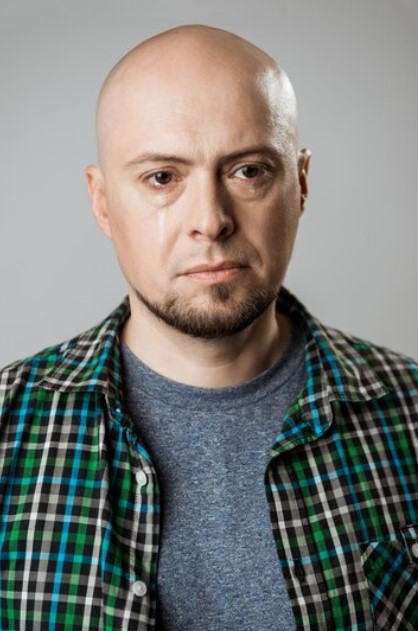
It’s obvious that men in general can get used to their appearance as bald (hair loss). Of course there is no problem with a man’s masculinity because he has no hair or perhaps only a few, but there is a reality that few people comment on.
There are men who have a certain concern for their appearance, that’s why hair loss can be a ghost that haunts many men who know that genetically they will have this tendency.
Hair loss is more than a simple factor in life that we have to get used to; for some men, it means a loss of self-esteem.
A man who is long term unhappy with his own appearance can develop depression in and everyone knows how harmful this is. So…
- How to resolve hair loss?
- What are the main methods?
- What are the main supplements that can help men in this appearance and self-esteem scenario?
Summary
The Most Common Hair Loss Solutions
Everyone knows that surgery is one of the most invasive methods for hair recovery, and our intention here is not to demonize this method, however, we would like to focus on preventative ways that can help you recover your hair naturally through the correct supplements.
Your doctor’s opinion counts a lot
There are several stages of baldness, and we know that in severe cases, men no longer have hair follicles, meaning recovery will certainly not happen by natural means.
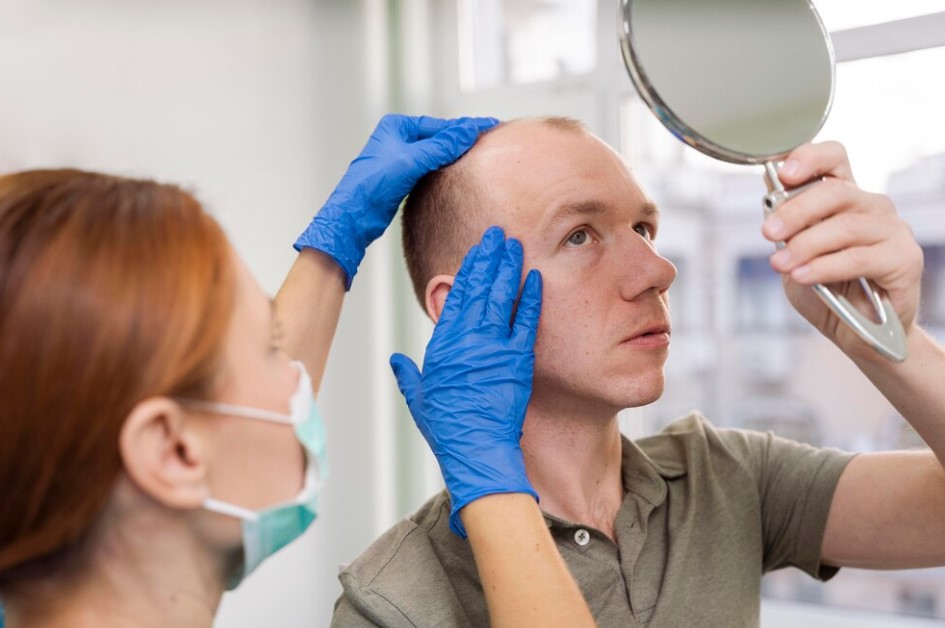
For this reason, we suggest that you always choose the professional route to obtain a more consistent opinion before taking any supplement that could cause you long-term harm.
The main reasons that make men to experience hair loss
There are many factors that can contribute to male baldness. We will mention each of these factors below and we would like you to evaluate which one best suits your current situation.
Genetics
Male pattern baldness is the most common cause of hair loss in men. It is hereditary and can be passed down from either the mother’s or father’s side of the family.
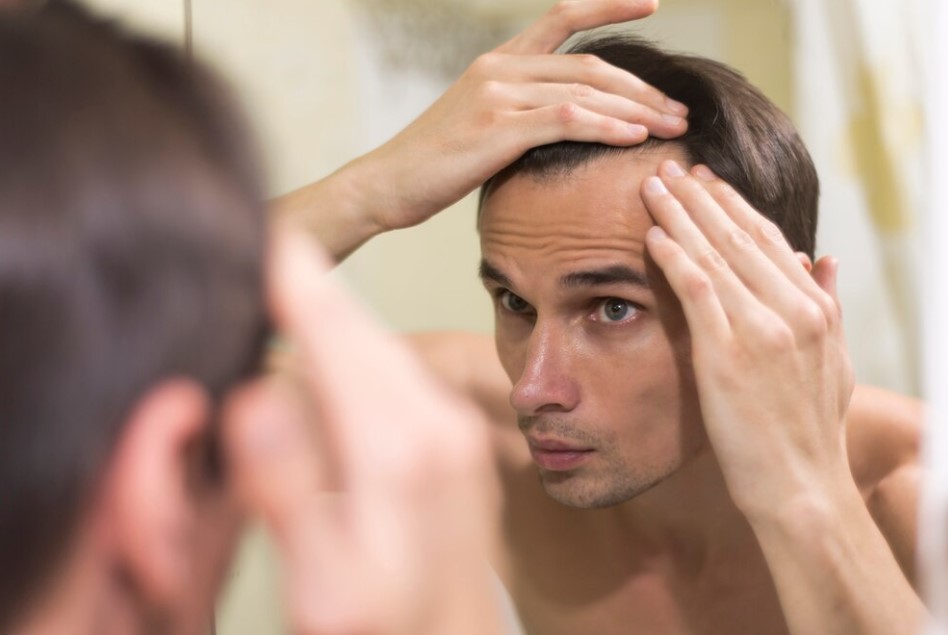
Hormonal Changes
Hormonal changes, particularly an increase in dihydrotestosterone (DHT), can contribute to hair loss.
DHT is a byproduct of testosterone and can shrink hair follicles, leading to thinner hair and eventual hair loss.
Aging is one of the most common factors of hair loss in men
As men age, hair follicles can shrink and produce finer, shorter hair strands. This process, known as miniaturization, can eventually lead to hair loss.
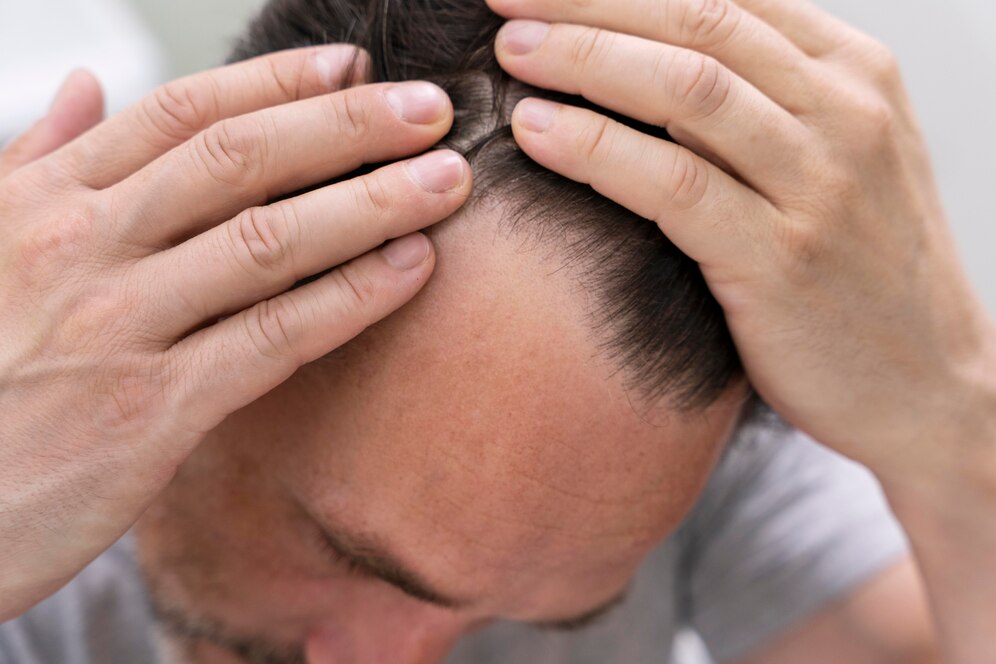
Medical Conditions
Certain medical conditions such as thyroid disorders, autoimmune diseases, and scalp infections can cause hair loss in men.
Medications and specific treatments can cause hair loss
Some medications, including those used for cancer, arthritis, depression, heart problems, and high blood pressure, can cause hair loss as a side effect.
Stress: Yes, a stressful routine could be the reason of your hair loss
Physical or emotional stress can disrupt the normal hair growth cycle, leading to temporary hair loss known as telogen effluvium.
Nutritional Deficiencies can cause hair loss
Inadequate intake of essential nutrients such as iron, protein, zinc, and vitamins can affect hair health and contribute to hair loss.
Lifestyle Factors
Poor lifestyle habits such as smoking, excessive alcohol consumption, and an unhealthy diet can also impact hair health and contribute to hair loss in men.
So, the question here is… Which on of the factor above matches to your reality?
While there are several factors that contribute to hair loss, including genetics, stress, and hormonal imbalances, incorporating certain supplements into your daily routine can help promote hair growth.
With so many options available, it can be difficult to determine which supplements are most effective.
In this blog post, we’ll explore three supplements that have been proven to support healthy hair growth, giving you the information you need to make an informed decision.
The 3 main supplements that can fight hair loss
While hair loss can be a distressing issue, incorporating certain supplements into your daily routine can significantly contribute to maintaining healthy hair and potentially preventing baldness.
In this article, we’ll explore three essential supplements – Biotin, Omega-3 fatty acids, and Zinc – and how they interact with the body to improve hormonal levels, thereby mitigating hair loss.
Biotin should be taken to avoid hair loss
Biotin, also known as Vitamin B7, plays a crucial role in the synthesis of keratin, a protein that forms the structural basis of hair, skin, and nails.
Adequate biotin levels are essential for maintaining healthy hair follicles and promoting hair growth.

Biotin aids in the metabolism of fatty acids, which are vital for maintaining the integrity of cell membranes, including those of hair follicles.
One of the ways biotin helps combat male baldness is by supporting hormone regulation.
Biotin interacts with enzymes involved in the metabolism of androgens, including dihydrotestosterone (DHT), a hormone implicated in male pattern baldness.
By modulating androgen metabolism, biotin helps to balance hormone levels, potentially reducing the negative effects of DHT on hair follicles.
Omega-3 Fatty Acids is important to prevent hair loss
Omega-3 fatty acids, primarily found in fatty fish such as salmon, mackerel, and sardines, are renowned for their anti-inflammatory properties and numerous health benefits.
In the context of hair health, omega-3 fatty acids play a crucial role in maintaining scalp health and promoting optimal circulation to hair follicles.
Chronic inflammation has been linked to various forms of hair loss, including male pattern baldness.
Omega-3 fatty acids help counteract inflammation by inhibiting the production of pro-inflammatory substances in the body.
By reducing inflammation within the scalp and hair follicles, omega-3 fatty acids create a more conducive environment for healthy hair growth and may help prevent hair loss associated with inflammatory conditions.
Furthermore, omega-3 fatty acids contribute to the regulation of hormone levels, including those implicated in male baldness.
By modulating hormone signaling pathways, omega-3 fatty acids can help maintain a hormonal balance that supports hair retention and growth.
Zinc plays an important role in hair loss for men
Zinc is an essential mineral that plays a vital role in numerous physiological processes, including immune function, wound healing, and DNA synthesis.
In the context of hair health, zinc is involved in the regulation of cellular proliferation, differentiation, and apoptosis within hair follicles.
One of the mechanisms by which zinc helps prevent male baldness is its involvement in the metabolism of androgens, particularly DHT.
Zinc inhibits the enzyme 5-alpha-reductase, which converts testosterone into DHT.
By blocking DHT production, zinc helps reduce the adverse effects of this hormone on hair follicles, thereby preserving hair density and preventing baldness.
Additionally, zinc contributes to the maintenance of a healthy scalp environment by regulating sebum production and combating microbial infections that can compromise hair follicle function.
By promoting scalp health and hormone balance, zinc supports optimal conditions for hair growth and may help prevent hair loss in men.
Our Conclusion about hair loss supplements
Attention!
We are not “preaching” a standard of beauty where being bald is something negative, on the contrary, we believe that men should feel good the way they think, however, our intention is to help those who see hair loss as a factor in low self-esteem .
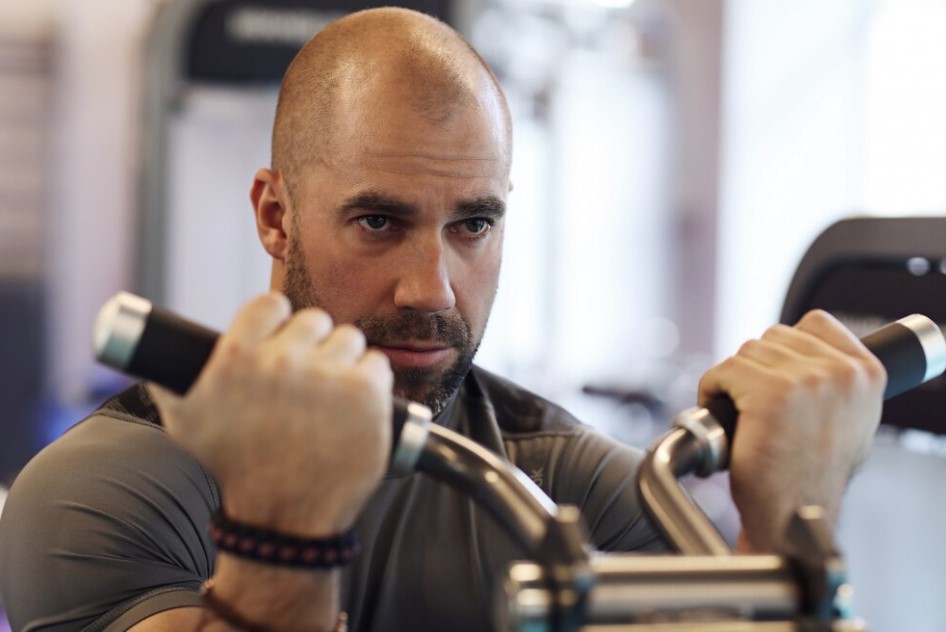
In summary, these three supplements have been shown to promote hair growth and improve overall hair health.
While individual results may vary, incorporating these supplements into your daily routine may be beneficial if you are experiencing hair-related issues.
We encourage you to leave a comment and share your experiences or any additional recommendations you may have for promoting hair growth.
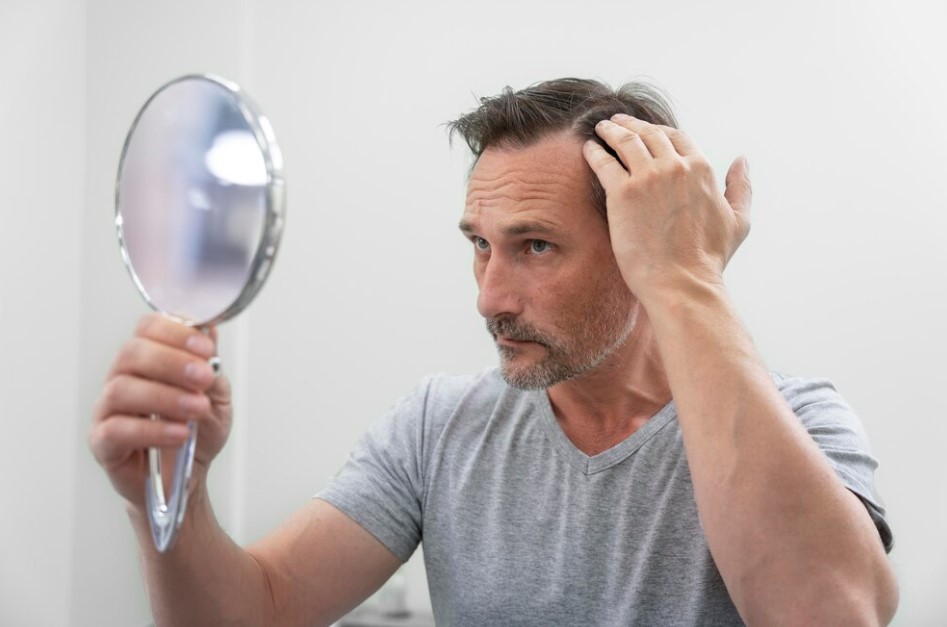
Deixe um comentário
Você precisa fazer o login para publicar um comentário.